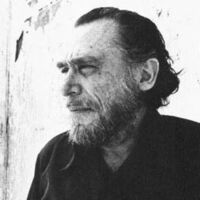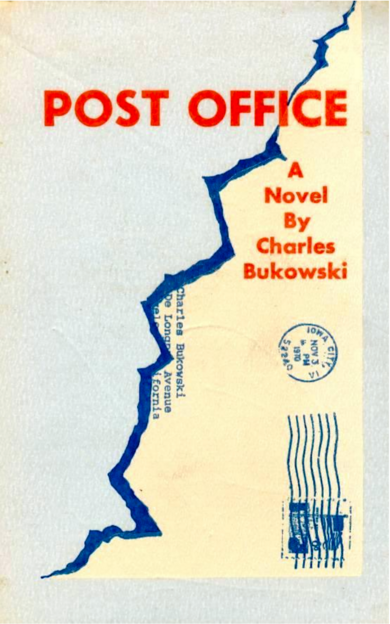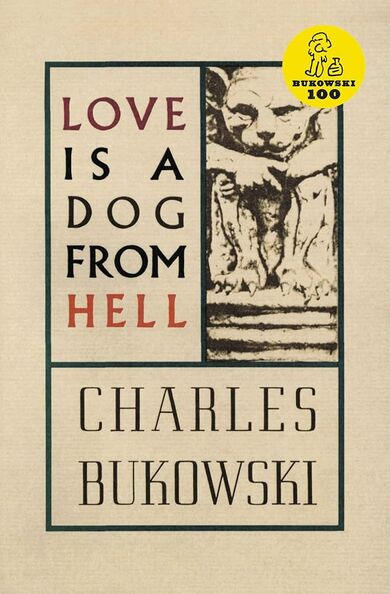Ham on Rye: 53
I was coming home from classes down Westview hill. I never had any
books to carry. I passed my exams by listening to the class lectures and by guessing at the answers. I never had to cram for exams. I could get my
“C’s.” And as I was coming down the hill I ran into a giant spider web. I
was always doing that. I stood there pulling the sticky web from myself and looking for the spider. Then I saw him: a big fat black son-of-a-bitch. I
crushed him. I had learned to hate spiders. When I went to hell I would be
eaten by a spider.
All my life, in that neighborhood, I had been walking into spider webs,
I had been attacked by blackbirds, I had lived with my father. Everything
was eternally dreary, dismal, damned. Even the weather was insolent and bitchy. It was either unbearably hot for weeks on end, or it rained, and
when it rained it rained for five or six days. The water came up over the
lawns and poured into the houses. Who’d ever planned the drainage system had probably been well paid for his ignorance about such matters.
And my own affairs were as bad, as dismal, as the day I had been born.
The only difference was that now I could drink now and then, though never
often enough. Drink was the only thing that kept a man from feeling forever stunned and useless. Everything else just kept picking and picking, hacking away. And nothing was interesting, nothing. The people were restrictive and careful, all alike. And I’ve got to live with these fuckers for the rest of
my life, I thought. God, they all had assholes and sexual organs and their mouths and their armpits. They shit and they chattered and they were dull as horse dung. The girls looked good from a distance, the sun shining through
their dresses, their hair. But get up close and listen to their minds
running out of their mouths, you felt like digging in under a hill and
hiding out with a tommy-gun. I would certainly never be able to be happy, to
get married, I could never have children. Hell, I couldn’t even get a job as a dishwasher.
Maybe I’d be a bank robber. Some god-damned thing. Something with
flare, fire. You only had one shot. Why be a window washer?
I lit a cigarette and walked further down the hill. Was I the only
person who was distracted by this future without a chance?
I saw another one of those big black spiders. He was about face-high,
in his web, right in my path. I took my cigarette and placed it against him.
The tremendous web shook and leaped as he jumped, the branches of the bush trembled. He leaped out of the web and fell to the sidewalk. Cowardly
killers, the whole bunch of .them. I crushed him with my shoe. A worthwhile
day, I had killed two spiders, I had upset the balance of nature—now we
would all be eaten up by the bugs and the Hies.
I walked further down the hill, I was near the bottom when a large bush
began to shake. The King Spider was after me. I strode forward to meet it.
My mother leaped out from behind the bush. “Henry, Henry, don’t
go home, don’t go home, your father will kill you!”
“How’s he going to do that? I can whip his ass.”
“No, he’s furious, Henry! Don’t go home, he’ll kill you! I’ve
been waiting here for hours!”
My mother’s eyes were wide with fear and quite beautiful, large and
brown.
“What’s he doing home this early?”
“He had a headache, he got the afternoon off!”
“I thought you were working, that you’d found a new job?”
She’d gotten a job as a housekeeper.
“He came and got me! He’s furious.' He’ll kill you.”
“Don’t worry, Mom, if he messes with me I’ll kick his goddamned ass, I
promise you.”
“Henry, he found your short stories and he read them!”
“I never asked him to read them.”
“He found them in a drawer! He read them, he read all of them!”
I had written ten or twelve short stories. Give a man a typewriter
and he becomes a writer. I had hidden the stories under the paper lining of my shorts-and-stockings drawer.
“Well,” I said, “the old man poked around and he got his fingers
burned.”
“He said that he was going to kill you! He said that no son of his
could write stories like that and live under the same roof with him!”
I took her by the arm. “Let’s go home. Morn, and see what he does ...”
“Henry, he’s thrown all your clothes out on the front lawn, all your dirty laundry, your typewriter, your suitcase and your stories!”
“My stories?”
“Yes, those too . . .”
“I’ll kill him!”
I pulled away from her and walked across 21st Street and toward
Longwood Avenue. She went after me.
“Henry, Henry, don’t go in there.”
The poor woman was yanking at the back of my shirt.
“Henry, listen, get yourself a room somewhere! Henry, I have ten
dollars! Take this ten dollars and get yourself a room somewhere!”
I turned. She was holding out the ten.
“Forget it,” I said. “I’ll just go.”
“Henry, take the money! Do it for me! Do it for your mother!”
“Well, all right . . .”
I took the ten, put it in my pocket.
“Thanks, that’s a lot of money.”
“It’s all right, Henry. I love you, Henry, but you must go.”
She ran ahead of me as I walked toward the house. Then I saw it:
everything was strewn across the lawn, all my dirty and clean clothes, the
suitcase flung there open, socks, shirts, pajamas, an old robe, everything
flung everywhere, on the lawn and into the street. And I saw my manuscripts
being blown in the wind, they were in the gutter, everywhere.
My mother ran up the driveway to the house and I screamed after her so
he could hear me, “TELL HIM TO COME OUT HERE AND I’LL KNOCK HIS GOD-DAMNED HEAD OFF!”
I went after my manuscripts first. That was the lowest of the blows,
doing that to me. They were the one thing he had no right to touch. As I
picked up each page from the gutter, from the lawn and from the street, I
began to feel better. I found every page I could, placed them in the
suitcase under the weight of a shoe, then rescued the typewriter. It had
broken out of its case but it looked all right. I looked at my rags
scattered about. I left the dirty laundry, I left the pajamas, which were
only a handed-down pair of his discards. There wasn’t much else to pack. I
closed the suitcase, picked it up with the typewriter and started to walk
away. I could see two faces peering after me from behind the drapes. But I
quickly forgot that, walked up Longwood, across 21st and up old Westview hill. I didn’t feel much different than I had always felt. I was neither
elated nor dejected; it all seemed to be just a continuation. I was going to take the “W” streetcar, get a transfer, and go somewhere downtown.






